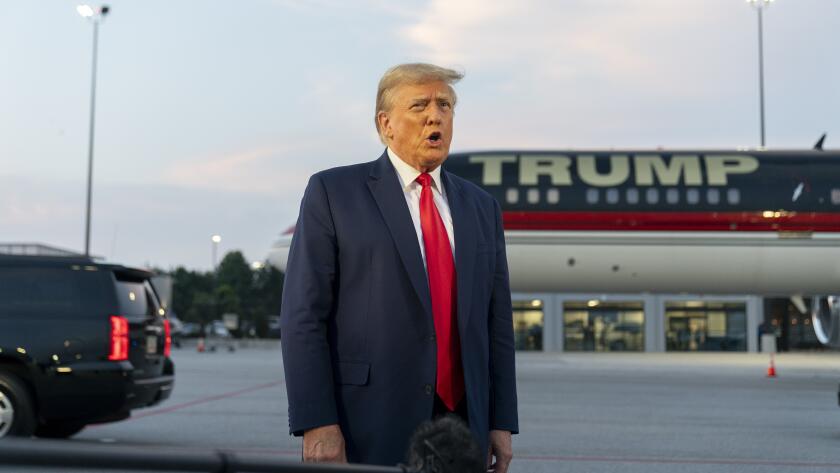Trump pleads not guilty and waives arraignment in Georgia election case
Former President Trump has pleaded not guilty and waived arraignment in the case related to efforts to overturn his 2020 election loss in Georgia.
ATLANTA — Former President Trump pleaded not guilty on Thursday and sought to sever his case from other defendants who are accused along with him of illegally trying to overturn the results of the 2020 election in Georgia.
Fulton County Superior Court Judge Scott McAfee had set arraignment hearings for Trump and the 18 others charged in the case for Sept. 6. A court filing waiving arraignment means Trump won’t have to show up for that.
The decision to skip an in-person appearance averts the dramatic arraignments that have accompanied the three other criminal cases Trump faces, in which the Republican former president has been forced amid tight security into a courtroom and entered “not guilty” pleas before crowds of spectators. Georgia courts have fairly permissive rules on news cameras in the courtroom, and this step means Trump won’t have to enter a plea on television.
An attorney for Trump also asked McAfee on Thursday to separate his case from those of defendants who have asked for an expedited trial that is scheduled to start on Oct. 23. Giving Trump less than two months to prepare a defense against a 98-page indictment would “violate [his] federal and state constitutional rights to a fair trial and due process of law,” attorney Steve Sadow said in a court filing.
Fulton County Dist. Atty. Fani Willis has said she wants all the defendants tried together, and she has asked the judge to set an Oct. 23 trial date for all.
The motion adds to the pretrial legal jousting that has dominated the two weeks since the indictment was brought, underscoring the complexities inherent in attempting to bring 19 defendants to trial at once and foreshadowing the delays ahead as judges sift through competing arguments from the defendants.
Trump and his 18 co-defendants were charged this month in a 41-count indictment that outlines an alleged scheme to subvert the will of Georgia voters who had chosen Democrat Joe Biden over the Republican incumbent in the presidential election.
Several other people charged in the indictment had already waived arraignment in filings with the court, saving them a trip to the courthouse in downtown Atlanta. Trump previously traveled to Georgia on Aug. 24 to turn himself in at the Fulton County Jail, where he became the first former president to have a mug shot taken.
The case, filed under Georgia’s Racketeer Influenced and Corrupt Organizations Act, or RICO, is sprawling, and the logistics of bringing it to trial are likely to be complicated.
At least two defendants have filed demands for a speedy trial and have asked to be tried separately from others in the case. The judge has set an Oct. 23 trial date for one of them, Kenneth Chesebro, a lawyer who worked on the coordination and execution of a plan to have 16 Georgia Republicans sign a certificate falsely stating that Trump won the state and declaring themselves the state’s “duly elected and qualified” electors.
Some of the others charged are trying to move their cases to federal court. A judge on Monday heard arguments on such a request by former White House Chief of Staff Mark Meadows, but the judge did not immediately rule.
Trump has characterized the cases against him — independent inquiries from different jurisdictions — as part of a politically motivated attempt to keep him from winning back the White House.
More to Read
Get the L.A. Times Politics newsletter
Deeply reported insights into legislation, politics and policy from Sacramento, Washington and beyond. In your inbox three times per week.
You may occasionally receive promotional content from the Los Angeles Times.











